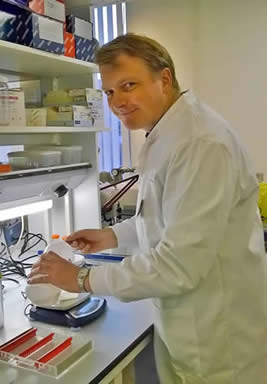Researchers
LPRG Investigators and Staff
The LPRG contains scientists and clinicians from the NHS, the Faculty of Biological Sciences and Faculty of Medicine and Health. Our research staff are world renowned and regularly publish in leading journals such as Neuron, the Journal of Neuroscience, PNAS, Molecular Psychiatry and Nature Genetics.
Investigators
 |
Prof. Chris InglehearnProf. Chris Inglehearn is a Professor within the Faculty of Medicine and Health. Chris' research has previously been focused upon the genetic basis of retinal defects. However, through the LPRG, Chris is turning his vast experience of genetics to psychaitric disorders. Chris acts as lead academic of the LPRG. See more of Chris’ work on his academic webpage. |
 |
Dr. Manir AliDr. Manir Ali is a Senior Research Fellow within Faculty of Medicine and Health. For more of Manir's work, see his academic webpage. |
Dr. Alastair CardnoDr. Alastair Cardno is a Senior Lecturer in Psychiatry within the Leeds Institute of Health Sciences. Alastair’s research focuses on the genetic and other influences on clinical variation in psychiatric disorders. See more of Alastair’s work on his academic webpage. |
Dr. Tariq MahmoodDr Tariq Mahmood is an NHS consultant who dabbles in research in his spare time and is enjoying a late spring in his research career. His first research project was studying the phenomenology of schizophrenia in Northern Pakistan in 1978 and he returns to this field 30 years later with projects in genetics, neurocognition, functional brain imaging and cognitive remediation. |
|
In the intervening years he followed the example of old masters by combining clinical work with teaching and research in Pakistan, Oman, Australia, New Zealand and the UK. He taught physiology, medicine and psychiatry at Army Medical College and Armed Forces Medical College in Pakistan and held a joint clinical academic position at University of Otago Medical School in Dunedin, New Zealand. It was in Dunedin that he had the opportunity to work in a model, which he now advocates and involves working in hospital wards, outpatient clinics and research labs. He was lucky in meeting one of Maudsley graduates in Professor Trevor Silverstone and his wife Professor Sarah Romans who invited him to join their affective disorders research group. They were maintaining a bipolar register and had an affective disorders research lab, which later on he was made in charge. This allowed him to study the association of migraine with bipolar disorder by carrying out prevalence studies in outpatients, try novel treatments such as clozapine in hospitalized patients and carry out neuroendocrine studies in affective disorders lab to investigate the role of serotonin in pathogenesis of bipolar disorder. Another stroke of luck brought him to Leeds, where he had the privilege of treating patients from Northern Pakistan and came across families with multiple cases of schizophrenia. This reignited his interest in genetics of schizophrenia, which he had given up to study bipolar disorder when asked by his teacher Sir Robin Murray at the Maudsley to replicate Da Fonseca’s study of bipolar twins. Therefore, when Alastair Cardno and Chris Inglehearn asked him to find consanguineous families with multiple cases of schizophrenia, he already had a number of them in his clinic. These families now form the nucleus of a research effort, which spans across genetics in collaboration with Leeds Institute of Molecular Medicine, cognitive psychology in collaboration with University of Manchester, functional magnetic resonance imaging in collaboration with SCANLab, University of Sheffield and computerized cognitive remediation in collaboration with universities of Manchester and Bradford. The aim of his research is to understand the pathogenesis of schizophrenia and bipolar disorder and to identify predictive risk markers. This will, hopefully, enable pre-morbid diagnosis, early treatment of emerging illnesses, remediation of cognitive handicaps, and prevention through health education of communities at higher risk. |
|
 |
Dr. Steven ClapcoteDr. Steven Clapcote is a lecturer based within the School of Biomedical Sciences. Steve undertook his Ph.D in Liverpool and subsequently worked with Prof. Chris Graham (Oxford) and Dr. John Roder (Mount Sinai Hospital, Toronto). Steve is interested in the molecular and genetic basis of psychiatric disorders, and has a strong background in the development and phenotyping of animal models of these disorders. For more about Steve's work, see his staff webpage. |
 |
Dr. James DachtlerDr. James Dachtler is currently a Wellcome Trust fellow within the Faculty of Biological Sciences. James is examining how genetic alterations that have been found in Schizophrenic and autistic patients alters synaptic physiology and behaviour. He has just written a chapter in the book 'Molecular Basis of Autism' (Springer) on the roles of neurexins and neuroligins in autism spectrum disorders. For more about James' work, see his staff webpage. |
 |
Dr. Jose Ivorra MartinezDr. Jose Ivorra is a research fellow within the Faculty of Biological Sciences. He is interested in the search of rare mutations that could be involved in the pathogenesis of schizophrenia. To do so, he is using next-generation sequencing techniques in endogamic and consaguineous families with multiple schizophrenia-affected members. |
 |
Mr. Ahmed Al-AmriAhmed is a Ph.D student supervised by Prof. Inglehearn, Dr. Ali and Dr. Clapcote. He is working to understand the genetic basis of schizophrenia in consaguineous families. |